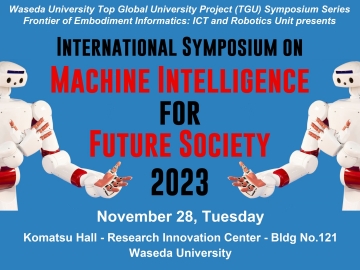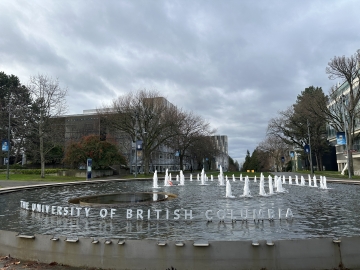KIKUCHI, Masanori
D2, Graduate School of Political Science
Masanori Kikuchi, a second-year doctoral student in the Graduate School of Political Science, has actively participated in TGU-sponsored programs and events by prominent scholars inside and outside Japan. Masanori, who will begin his study as a Ph.D. student in the United States this fall, recalls that the four-week program that he participated in the U.S. in 2019 had stimulated him to think deeply about what his strengths would be if he were to study abroad. We interviewed Masanori in anticipation of his trip to the U.S.
Please tell us why you chose to study at the Graduate School of Political Science and what your research interests are.
—I applied to the Graduate School of Political Science at Waseda University to gain the essential skills to conduct empirical research in political science. Many professors who employ empirical methods in their research, including my advisor Professor Masaru Kohno (Faculty of Political Science and Economics, School of Political Science and Economics), have obtained their Ph.D. abroad. I believe my research skills, in practice, have been enhanced thanks to opportunities to study with professors at Waseda. My current research interests include the link between international politics and identity, and more broadly, international relations and methodology.
You have actively participated in TGU-sponsored programs and workshops. In particular, what is your most memorable experience, and what did you gain from the ICPSR Summer Program that you participated in the U.S. in 2019?
—The greatest benefit of attending the ICPSR at the University of Michigan was to gain a sense of what the atmosphere of U.S. graduate schools is like. I naturally gained skills in applying new empirical methods from the ICPSR courses. However, as someone without experience in long-term study overseas, having the opportunities to talk with professors from the University of Michigan, one of the top schools of political science, were the most precious and fruitful moments. Visiting professors’ offices and participating in their seminars stimulated me to reflect on what would be my strengths if I were to study there. Moreover, I realized the importance of choosing a research topic that is not only theoretically interesting but also connected to my own life experience after hearing what motivated Michigan’s students to decide to pursue their Ph.D. study.
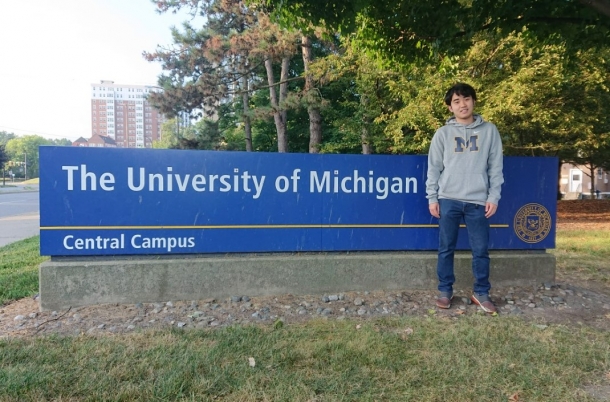
On the University of Michigan Campus (2019)
You presented your paper “How does war affect cultural tolerance? Evidence from concert programs, 1900- 1960” at “WE-SPICE“, a joint workshop held last year by Waseda University and University of Essex. We understand that this paper is scheduled to be published in an international journal.
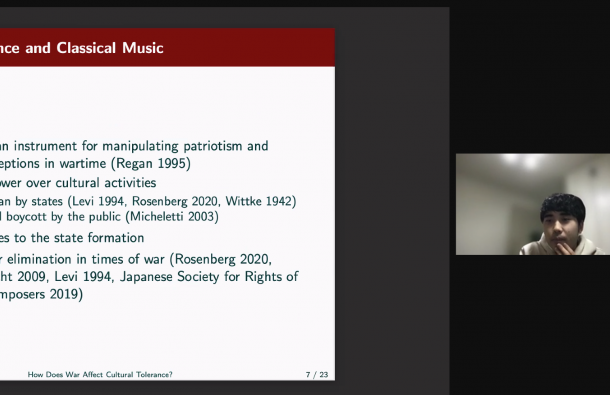
Presentation at the WE-SPICE 2021
—My revised master’s thesis was recently accepted by the international peer-reviewed Journal of Peace Research. While writing this paper, I received a great deal of guidance from my supervisor, Professor Kohno, and countless feedback from Professor Kentaro Hirose, a lecturer at the Faculty of Political Science and Economics at that time. In addition, Professor Atsushi Tago encouraged me to present my paper in several workshops along with providing various advice on my manuscript. I also received feedback from professors from in and outside Japan, including discussants and audiences at seminars and workshops, which helped me to revise the paper. I believe that I could not have completed the work without all the help.
You will be studying abroad at Washington University in St. Louis (Missouri, U.S.) starting this fall.
—Washington University is known for its excellent program in methodology. I first would like to learn the basics of quantitative methods mathematically and then hope to work on advanced research related to my research interest on the connection between international politics and identity. I also aim to become a person who can conduct research independently as soon as possible.
This summer, you attended an intensive course by Professor Daniel Aldrich (Northeastern University), who had been invited to Waseda through the TGU project. Professor Aldrich spoke highly of you, describing you as a student with “a strong work ethic” and the ability “to write up a strong presentation and prepare written materials on the scale of high level U.S. based graduate students”.
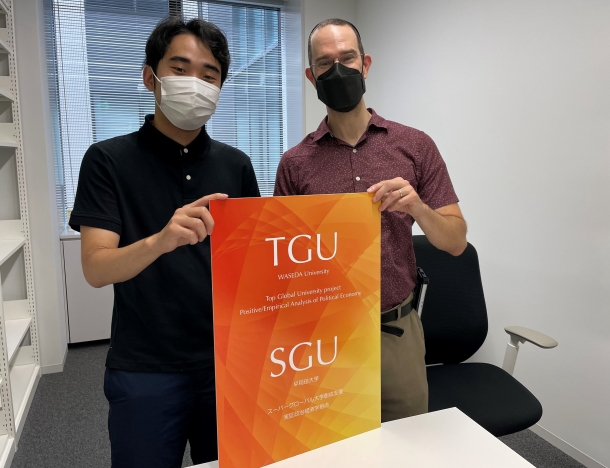
Masanori (left) with Prof. Aldrich (right)
—Professor Aldrich provided me with a great chance to learn about the political and societal impact of natural disasters and the recovery from natural disasters, mainly through Japanese case studies such as the Great East Japan Earthquake and the Great Hanshin-Awaji Earthquake. I also received many practical tips for surviving in academia on giving presentations, building a network among researchers, etc. I was very fortunate that I could take his class.
What are your goals or dreams for the future?
—In the future, I hope to become a political scientist contributing to international and social issues. Specifically, I have in mind issues such as immigration, human rights, and diversity from the perspective of an international relations scholar.
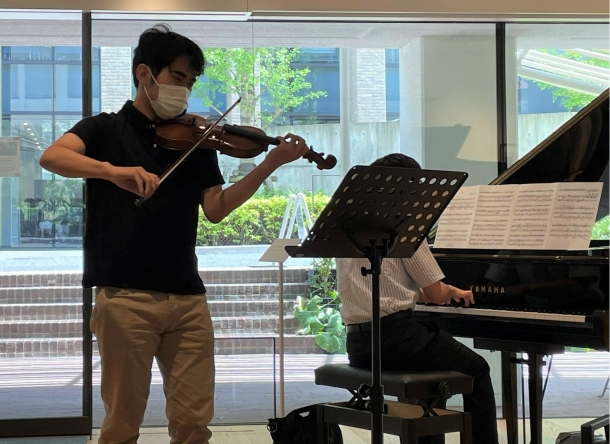
Masanori played the violin at an on-campus music event in June, 2022

